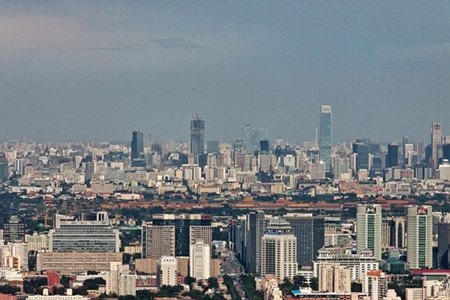
Fast Urbanization Does not Boost Economy, Study Shows
Sep 05, 2014 Email"> PrintText Size

World became more urbanized over the last three decades. Expanding urban areas helped to boost local economies. Many policy makers think that fast development of the cities can be beneficial. However, this assumption is unwarranted. A recent study carried out by Chinese scientists failed to find correlation between urbanization speed and GDP rate

Picture: Beijing panorama. Image credit: ahenobarbus/Flickr, CC-BY 2.0
“Hence, we conclude that a given country cannot obtain the expected economic benefits from accelerated urbanization, especially if it takes the form of government-led urbanization. In addition, only when all facets are taken into consideration can we fully assess the urbanization process,” the scholars argue.
Positive relationship between enlargement of the cities and economic improvement is well documented. This study only supports this position. Some countries, such as China or Korea, managed to combine fast increase of GDP with explosive build up of the metropolitan areas and became roles models for other developing areas.
“It is generally accepted that economic growth promotes the expansion of modern industries and an increase in the urban population; in turn, urbanization also promotes economic growth to some extent. Various programs of accelerated urbanization and rapid economic growth have, therefore, been embarked upon in many developing countries,” the scholars say. However, Mingxing Chen and his colleagues argue that situation is not so simple.
They have investigated how urbanization speed affected economic prosperity since 1980′s. “In the medium to short term, urbanization speed has little effect on economic growth rate. Consequently, accelerated urbanization without parallel economic growth often occurs in the world,” the researchers claim.
There is no doubt, that this discovery can have significant policy implications. It shows that value of urbanization speed is overrated. Politicians should focus on other factors which could develop country’s economy, such as institutional reforms or educational development. In addition, scholars point out that expansion of the cities is a complex phenomenon tightly related to many important issues. “The forward effects of urbanization should be comprehensively evaluated, including economic, social, and environmental sustainability,” they say.
Article: Chen M., Zhang H., Liu W., Zhang W., 2014, The Global Pattern of Urbanization and Economic Growth: Evidence from the Last Three Decades. PloS ONE 9(8): e103799. doi:10.1371/journal.pone.0103799. (Technology.org)
World became more urbanized over the last three decades. Expanding urban areas helped to boost local economies. Many policy makers think that fast development of the cities can be beneficial. However, this assumption is unwarranted. A recent study carried out by Chinese scientists failed to find correlation between urbanization speed and GDP rate
|
|
| Picture: Beijing panorama. Image credit: ahenobarbus/Flickr, CC-BY 2.0 |
“Hence, we conclude that a given country cannot obtain the expected economic benefits from accelerated urbanization, especially if it takes the form of government-led urbanization. In addition, only when all facets are taken into consideration can we fully assess the urbanization process,” the scholars argue.
Positive relationship between enlargement of the cities and economic improvement is well documented. This study only supports this position. Some countries, such as China or Korea, managed to combine fast increase of GDP with explosive build up of the metropolitan areas and became roles models for other developing areas.
“It is generally accepted that economic growth promotes the expansion of modern industries and an increase in the urban population; in turn, urbanization also promotes economic growth to some extent. Various programs of accelerated urbanization and rapid economic growth have, therefore, been embarked upon in many developing countries,” the scholars say. However, Mingxing Chen and his colleagues argue that situation is not so simple.
They have investigated how urbanization speed affected economic prosperity since 1980′s. “In the medium to short term, urbanization speed has little effect on economic growth rate. Consequently, accelerated urbanization without parallel economic growth often occurs in the world,” the researchers claim.
There is no doubt, that this discovery can have significant policy implications. It shows that value of urbanization speed is overrated. Politicians should focus on other factors which could develop country’s economy, such as institutional reforms or educational development. In addition, scholars point out that expansion of the cities is a complex phenomenon tightly related to many important issues. “The forward effects of urbanization should be comprehensively evaluated, including economic, social, and environmental sustainability,” they say.
Article: Chen M., Zhang H., Liu W., Zhang W., 2014, The Global Pattern of Urbanization and Economic Growth: Evidence from the Last Three Decades. PloS ONE 9(8): e103799. doi:10.1371/journal.pone.0103799. (Technology.org)
CAS Institutes
There are 124 Institutions directly under the CAS by the end of 2012, with 104 research institutes, five universities & supporting organizations, 12 management organizations that consist of the headquarters and branches, and three other units. Moreover, there are 25 legal entities affiliated and 22 CAS invested holding enterprisesThere are 124 I...>> more
Contact Us

Chinese Academy of Sciences
Add: 52 Sanlihe Rd., Xicheng District, Beijing, China
Postcode: 100864
Tel: 86-10-68597592 (day) 86-10-68597289 (night)
Fax: 86-10-68511095 (day) 86-10-68512458 (night)
E-mail: cas_en@cas.cn

